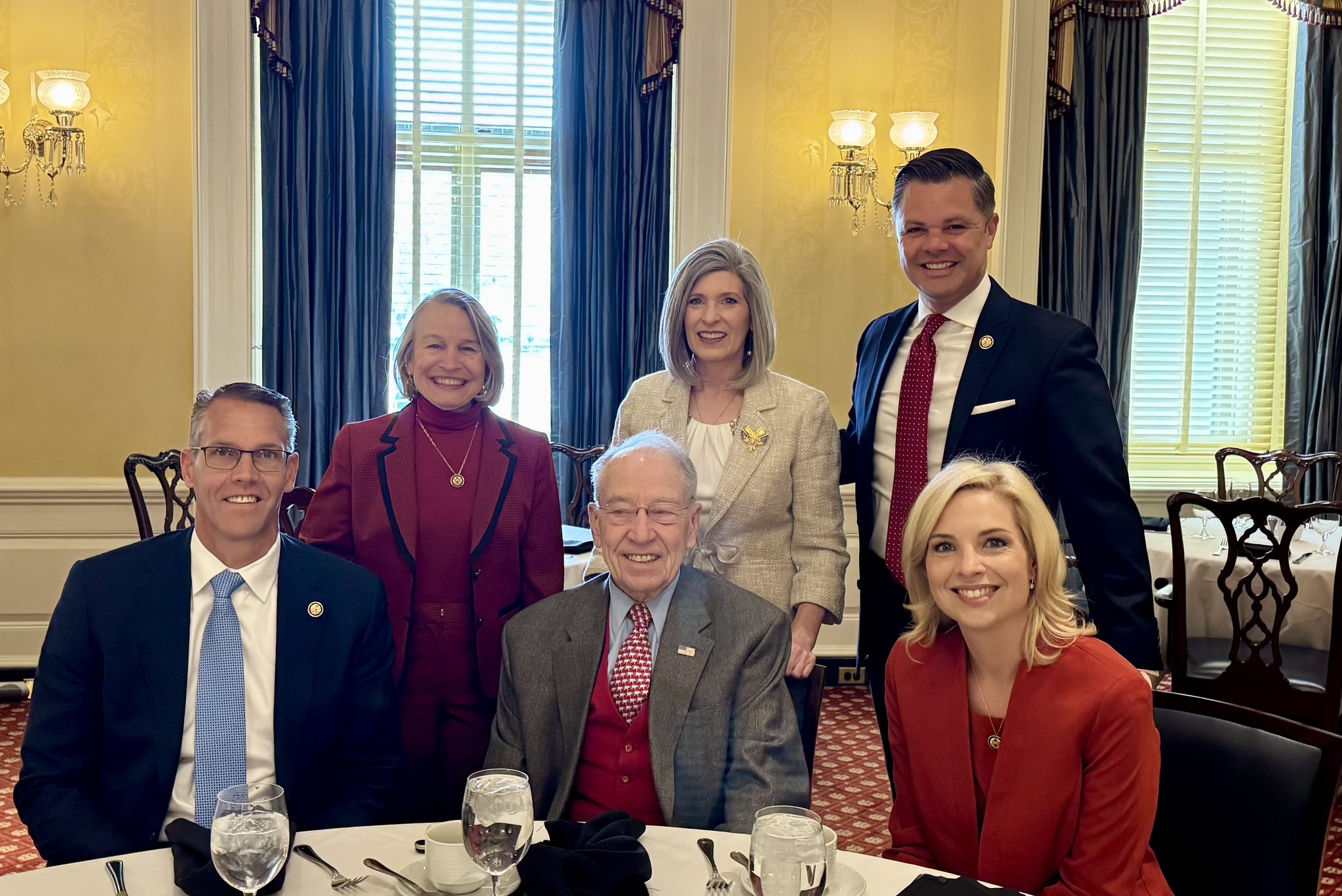Rick Morain is the former publisher and owner of the Jefferson Herald, for which he writes a regular column.
Rarely, if ever, have Iowa’s members of Congress found themselves situated to alter the course of America’s economy. But right now they can, and one of the six in the delegation has already taken a first step to do so.
Last week, President Donald Trump imposed harsh tariffs on every nation in the world that trades with us. He did so by fiat, something he claims empowerment to do without so much as even consulting Congress. The Republican majorities of 53-47 in the Senate and 220-213 in the House have remained almost unanimously acquiescent.
SENATE
Until April 2. That’s when four Republican senators—Susan Collins of Maine, Lisa Murkowski of Alaska, and Rand Paul and Mitch McConnell, both of Kentucky—joined the Senate Democrats to hem in Trump’s tariff authority. With their support, the Senate voted 51 to 48 to prevent Trump’s threatened tariffs on Canadian imports into the United States.
Iowa’s Senators Chuck Grassley and Joni Ernst did not support that effort. But the following day, Grassley and Democratic Senator Maria Cantwell of Washington cosponsored a bill, the Trade Review Act of 2025, which would continue to shrink Trump’s tariff power.
Their bill would require the president to notify Congress within 48 hours after he imposed any new tariffs, and to state the reasons for the new tariffs and their expected effects on American individuals and businesses. If Congress didn’t approve the new tariffs within 60 days, they would expire. In addition, Congress could pass a resolution to kill existing tariffs at any time.
The Republican majority in the Senate stands at 53 to 47 (the 47 include independents who caucus with the Democrats). If all Democrats and independents vote for the Grassley-Cantwell bill, it would take just four Republicans to carry the day.
At this writing, six Republican senators have signed on as co-sponsors of the Grassley-Cantwell bill: Thom Tillis of North Carolina, Jerry Moran of Kansas, Susan Collins of Maine, Lisa Murkowski of Alaska, Mitch McConnell of Kentucky, and Todd Young of Indiana. So even without Paul (who voted last week to revoke the tariffs on Canada), the Senate has the votes to pass this bill.
If this legislation came to the floor, eyes would turn to Senator Joni Ernst, who represents the same Iowa constituency as Grassley. She would disappoint a lot of Iowans if she voted against Grassley’s effort.
However, on April 7 the White House announced that Trump would veto the Trade Review Act of 2025. A written statement declared, “This bill would dangerously hamper the President’s authority and duty to determine our foreign policy and protect our national security.”
Burgess Everett, the Congressional bureau chief for Semafor, quoted Grassley as saying he wasn’t surprised by the veto threat and “hasn’t had a discussion yet about whether he’ll get a floor vote.” But Senate Majority Leader John Thune said of the Grassley-Cantwell bill, “I don’t think that has a future. The president’s indicated he would veto it.”
HOUSE
If the Senate did try to limit the president’s authority in this area, the legislation would need approval in the House as well. House Speaker Mike Johnson of Louisiana refuses to take up any tariff legislation that might inhibit Trump. But House rules permit a majority of members to file a discharge petition, which forces a vote on a bill regardless of the Speaker’s wishes.
Democratic Representative Gregory Meeks of New York announced on April 3 that he will file a petition similar to the Senate’s bill to cancel Trump’s threatened Canadian tariffs. Since the discharge petition rule requires a majority (218) of the House to sign on to it, and since Republicans control the House 220 to 213, the petition will require at least five Republican signatures, assuming all 213 Democrats sign it. GOP Representative Don Bacon of Nebraska has already said he will probably sign the petition.
That reduces the number of other Republicans needed to four.
And Iowa has four Republican House members.
Given the prevailing anti-tariff sentiment in Iowa, it would be interesting to hear any good reasons for Representatives Mariannette Miller-Meeks (IA-01), Ashley Hinson (IA-02), Zach Nunn (IA-03), and Randy Feenstra (IA-04) not to sign on to this effort.
How does a Canadian tariff help Iowa? Is there any logical reason why our state’s members of Congress should support this policy?
Barring a credible economic rationale, the only reason any of Iowa’s delegation might resist the discharge petition is political timidity: fear of Donald Trump, and fear of his Iowa supporters.
It’s not an admirable attitude, and it’s unworthy of those elected to represent Iowa’s interests.
On the other hand, the six Iowans in Congress, by dint of the close political margins in both chambers, could defang the threatened Canadian tariffs by signing on to the proposed bills. And they could go further: by joining the Democrats and a few Republicans, like Grassley, they could tear down Trump’s entire unnecessary tariff edifice.
Trump could of course veto the bills, with little fear of an override, but Congress has enough constitutional bargaining authority concerning presidential powers to cause him to consider the consequences of such a veto.
Shakespeare’s Hamlet said it best: “’Tis a consummation devoutly to be wish’d.”
Top photo was first published on Representative Zach Nunn’s official Facebook page.

